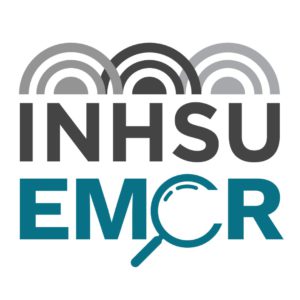19 December 2023
 During INHSU 2023 in Geneva, Switzerland, our Early-Mid-Career Researchers Special Interest Group (INHSU EMCR) hosted a session called ‘Extending your research impact as an EMCR: The intersections of academia, policy and implementation’. The session provided an opportunity for researchers to meet with public health and policy experts, discover how they can collaborate for impact, and explore non-academic career paths.
During INHSU 2023 in Geneva, Switzerland, our Early-Mid-Career Researchers Special Interest Group (INHSU EMCR) hosted a session called ‘Extending your research impact as an EMCR: The intersections of academia, policy and implementation’. The session provided an opportunity for researchers to meet with public health and policy experts, discover how they can collaborate for impact, and explore non-academic career paths.
Chaired by Aïssata Sako (INHSU EMCR Exec Committee) and Joshua Dawe (INHSU EMCR SIG member), the panel welcomed Naomi Burke Shyne (Executive Director, Harm Reduction International), Ernst Wisse (Medicines du Monde [MDM]), Monica Ciupagea (United Nations Office on Drugs and Crime [UNODC]), and Andrew Scheibe (TB HIV Care, South Africa).
Panellists discussed their experiences collaborating with researchers and shared valuable tips on how researchers can use their skills to transition into not-for-profit or government organisations and non-academic sectors.
5 ways researchers and community organisations/NGOs can work together
1. Create shared goals and agendas
Tensions sometimes exist between researchers and community organisations/NGOs due to different priorities, expectations, goals, and working methods. However, both NGOs and researchers share the common goal of wanting to improve the lives of people who use drugs. Acknowledging and aligning with these shared priorities can bridge gaps and foster more productive collaborations.
NGOs possess crucial ‘on the ground’ insights into hard-to-reach populations, and collaborating allows researchers to understand community needs better and tailor research to address these specific needs effectively. When working together, always create a shared agenda. For example, ask NGOs and community organisations, “What do you want to achieve, and why?” and “How do you think we can get there?”
2. Provide research and evaluation support where they don’t have it
Many community organisations and NGOs already collect a lot of data, which is needed for grant reporting, policy and advocacy, and recognising gaps in programming. But they may not have the capacity or knowledge to analyse it effectively. Researchers can add value by assisting with data analysis, offering support in writing reports, or connecting them with research organisations or students to undertake projects they lack the capacity for.
Educating and empowering healthcare workers, harm reduction workers, and communities about the importance of research and evaluation can also enhance the impact of programs and services.
3. Communicate your findings effectively
The session highlighted how important it is to communicate research findings in accessible language to NGOs, community organisations, and policymakers. Bridging the gap between academic jargon and layman’s terms enhances the understanding and utility of the research and is an ethical consideration that’s often forgotten about.
It’s also important to remember that being published in academic journals isn’t the most important thing for most organisations. The primary purpose of research is to make a difference in the lives of disadvantaged population groups – and if findings cannot be academically published, that’s OK.
4. Remember that qualitative research is powerful for policy
Qualitative research holds significant sway in shaping policy due to its capacity to explore nuanced issues, providing answers beyond the scope of quantitative studies. The narratives it unveils possess a unique power to evoke emotional responses, potentially altering perceptions and convictions.
Yet, qualitative research is often undervalued in policy and academic domains. This highlights the need for advocacy efforts to increase understanding of the importance of qualitative research.
5. Consider the ethical implications of collaboration
The session highlighted how important it is to involve people who the research is about and for in the research processes. Not only is this respectful, but it can bring more meaningful outcomes to the process and the findings produced. This is particularly important in low-middle-income countries, where unethical research studies often extract knowledge via surveys without real meaningful collaboration.

